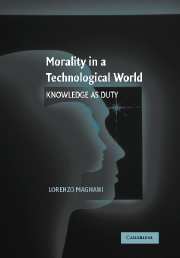Book contents
- Frontmatter
- Contents
- Preface
- 1 Respecting People as Things: Environment
- 2 Treating People as Means: Cloning
- 3 Hybrid People, Hybrid Selves: Artifacts, Consciousness, Free Will
- 4 Knowledge as Duty: Cyberprivacy
- 5 Freedom and Responsibility: Bad Faith
- 6 Creating Ethics: Good Reasons and Good Arguments
- 7 Inferring Reasons: Practical Reasoning, Abduction, Moral Mediators
- Afterword
- References
- Index
2 - Treating People as Means: Cloning
Published online by Cambridge University Press: 18 July 2009
- Frontmatter
- Contents
- Preface
- 1 Respecting People as Things: Environment
- 2 Treating People as Means: Cloning
- 3 Hybrid People, Hybrid Selves: Artifacts, Consciousness, Free Will
- 4 Knowledge as Duty: Cyberprivacy
- 5 Freedom and Responsibility: Bad Faith
- 6 Creating Ethics: Good Reasons and Good Arguments
- 7 Inferring Reasons: Practical Reasoning, Abduction, Moral Mediators
- Afterword
- References
- Index
Summary
It still remains unrecognized, that to bring the child into existence without a fair prospect of being able, not only to provide food for its body, but instruction and training for its mind, is a moral crime, both against the unfortunate offspring and against society; and that if the parent does not fulfil this obligation, the State ought to see it fulfilled, at the charge, as far as possible, of the parent.
John Stuart Mill, On LibertyThe concept of “respecting people as things” provides an ethical framework allowing us to analyze many aspects of the modern human condition, like the medicalization of life and the effects of biotechnologies. I contended in the previous chapter that the modern undermining of Immanuel Kant's distinction between instrumental value (based on ends and outcomes) and intrinsic value (ends in themselves) results from the blurring of traditional distinctions between humans and things (machines, for example) and between natural things and artifacts. I am convinced that this shift in thought in some sense contradicts the Kantian idea that we should not treat people as means, a notion often cited by those who are suspicious of biotechnology.
Indeed, when one condemns human cloning, one usually appeals to Kant's moral principle that a person should not be treated simply as a means to other people's ends; an example might be the biotechnological cloning of a human being solely for use as a bone marrow donor.
- Type
- Chapter
- Information
- Morality in a Technological WorldKnowledge as Duty, pp. 30 - 51Publisher: Cambridge University PressPrint publication year: 2007



